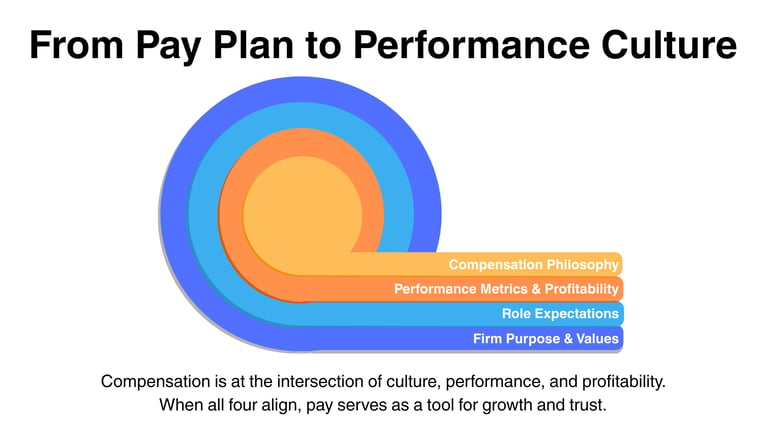Compensation Planning: Build Your Compensation Philosophy BEFORE Talking About Bonuses
Every autumn, advisory firm leaders gather around their spreadsheets to determine bonuses, raises, and year-end profit sharing. It’s the season of pumpkin-spice lattes and compensation planning. Unfortunately, these conversations often take place without a clear playbook. Traditional compensation planning tends to focus on the ‘what’ and the ‘how much’ rather than where the focus actually should be – on the ‘why:’
- Why do we pay people the way we do?
- What message are we conveying about the things that truly matter here?
- And how does that connect to performance, culture, and growth?
These questions are central to constructing your firm’s compensation philosophy – a clear, written statement of how the business will reward performance, share success, and align pay with purpose. It addresses the important questions every team member is quietly asking.
- How are compensation decisions made here?
- What behaviors are rewarded?
- Can I trust this to be a fair and objective process?
Without this essential framework to align performance, culture, and profitability, leaders often revert to a reactive mode; managing expectations, defending budgets, and explaining decisions after the fact. With it, however, compensation decisions become more consistent, confident, and credible.
Organizations without a clear compensation strategy face a 35% higher turnover rate and significantly lower employee engagement.1
It’s also important to realize that compensation planning isn’t just about money – it’s about building trust. As a Harvard University research study points out, when employees understand why compensation decisions are made, even if they disagree with the result, trust in leadership increases significantly.
When you intentionally do not answer these questions, team members will fill in the blanks emotionally.
THE CORE BUILDING BLOCKS OF A STRONG COMPENSATION PHILOSOPHY
Every advisory firm needs to define and document the following eight key compensation elements:
-
Pay Positioning– Choose where you want to sit in relation to the market (e.g., 50th–60th percentile). The important part isn’t the number, it’s the purpose.
-
Pay Mix– Balance fixed salary with variable incentives. Too much fixed pay can lead to complacency for some, while providing stability for others; too much variable pay can cause anxiety for some, and motivate others.
-
Performance Linkage– Establish clear, measurable connections between performance and pay. Define metrics upfront (e.g., AUM growth, client retention, collaboration, etc.).
-
Differentiation and Fairness– Not all contributions are equal. Explain how differentiation functions so people are able to see fairness, logic, and consistency.
-
Profit Sharing or Equity Participation– Decide how or whether you’ll distribute profits, grant ownership, or both, and how this relates to succession and engaging the next generation.
-
Budget Discipline– Maintain total compensation within established guardrails that safeguard profitability.
-
Transparency and Communication – Practice ‘structured transparency.’ People might not know everyone’s pay, but they should understand the process.
-
Review and Adaptability– Revisit your philosophy annually. It should develop alongside your strategy, culture, and economy.

STRUCTURING YOUR FIRM’S COMPENSATION PHILOSOPHY
Does your firm lack a formal compensation philosophy? Does it exist, but only in your mind? Or if you have one, is it time for a refresh? Use the following as a roadmap to develop or enhance your structure:
-
Audit Your Current Structure – List every role, base salary, and bonus formula. Identify outdated practices or inconsistencies.
-
Define Your Guiding Principles – Identify which values shape your philosophy (growth, collaboration, client experience, or leadership development).
-
Draft Your Philosophy Statement – Keep it concise. For example, “Our firm rewards performance, teamwork, and development in ways that support profitability and our long-term goals. We prioritize fairness, transparency, and sustainability in all decisions about pay.”
-
Model Scenarios – Test your structure across best- and worst-case revenue scenarios to ensure sustainability.
-
Communicate the Philosophy, Then the Numbers – Present your philosophy before revealing pay changes. Context encourages a better understanding.
-
Train Your Leaders – Equip leaders with clear language. Replace vague comments like “it’s just the budget” with more specific statements such as “our documented compensation philosophy guided this decision.”
-
Conduct an annual review – assess whether your compensation model effectively supports performance, retention, and profitability, and make adjustments as needed.
Before finalizing bonuses or next year’s budget, now is a good time to sit down and consider these important questions:
- What story does our compensation plan reveal about our culture?
- Are we truly rewarding the outcomes and behaviors we claim to value?
- Do our team members understand how their contributions directly impact the firm's results?
- How can we guarantee fairness and sustainability?
Remember: your compensation philosophy is not a policy – it’s a promise. A promise that your team’s work matters, their effort is recognized, and their growth is part of something bigger.
THE PAYOFF: CLARITY & MEANING
Compensation can be emotional. After all, it’s directly linked to recognition, security, and a sense of belonging. So, if your team doesn’t understand your philosophy, they’ll just craft their own story – a version that often erodes trust. But if you take the time to develop and share your philosophy, something changes:
- Compensation shifts from being just a transaction to the basis of a relationship.
- Pay reviews turn into learning opportunities rather than a cause for anxiety.
- Leaders dedicate more time to development and less to defending.
Harvard and Korn Ferry both confirm it: clarity builds trust, and trust enhances performance. Your compensation philosophy isn’t just about pay; it’s about who you are as a firm, what you value, and how you lead. It reveals your company's core values and forms the foundation for recognition, rewards, and development.
When executed effectively, your compensation philosophy can serve as one of your most powerful leadership tools. It shifts the focus from just money to the mission. It promotes financial literacy, fosters ownership, and encourages behaviors that support growth. As one CEO I work with said: “We stopped paying people to simply show up and started rewarding those who step up, grow, and lead.”
Without it, year-end planning becomes reactive. With it, you gain alignment, purpose, and confidence.
COACHING QUESTIONS FROM THIS ARTICLE
- How can our compensation philosophy reinforce the culture and behaviors we want to encourage?
- If every team member fully understood how compensation decisions are made, how would trust and motivation be impacted?
- How might our structure evolve as we grow; what principles should remain constant, and what can be flexible?
- How can we effectively utilize our compensation philosophy to promote financial literacy and an ownership mindset among the team?
1 Korn Ferry 2025 Workforce Survey
About ClientWise LLC
ClientWise is the premier business and executive coaching firm working exclusively with financial professionals. We specialize in helping clients optimize growth and maximize revenue by engaging as a knowledgeable partner in accomplishing specific and significant business results. Our full-service coaching program empowers financial advisors, wholesalers, managers and executives to enhance performance through customized, action-oriented solutions based on each client’s specific vision and situation.
Our certified coaches are members of the International Coach Federation (ICF). They adhere to ICF’s strict code of ethics and have the experience and insight to work with you on the unique challenges and opportunities you face each day.
Drawing from an in-depth knowledge of the financial industry, ClientWise’s mission is to professionally develop industry leaders and consistently raise the bar for industry service, commitment and integrity. Simply put, our singular focus is to help you get clear, get focused, and get results.
Topics: Team Development Leadership Business Planning Most Recent



